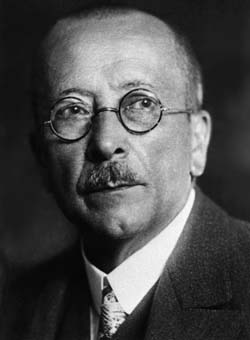Fritz Pregl


Fritz Pregl (3 September 1869 – 13 December 1930) was an Austrian chemist and physician who was awarded the Nobel Prize in Chemistry in 1923 for his pioneering work in the field of microanalysis. His contributions significantly advanced the methods used in quantitative organic microanalysis, allowing for the precise measurement of small quantities of substances.
Early Life and Education[edit]
Fritz Pregl was born in Ljubljana, which was then part of the Austro-Hungarian Empire. He studied medicine at the University of Graz, where he later became a professor. His early work focused on physiology and pathology, but he soon turned his attention to chemistry.
Career and Research[edit]
Pregl's most notable achievement was the development of techniques for microanalysis, which involves the analysis of very small amounts of chemical substances. This was particularly important for the study of biological compounds, where only minute quantities are often available. His methods allowed for the accurate determination of carbon, hydrogen, nitrogen, and sulfur in organic compounds.
Pregl's work was instrumental in the advancement of biochemistry and pharmacology, as it enabled researchers to analyze the chemical composition of biological samples with unprecedented precision. His techniques are still in use today and have been further refined by subsequent generations of scientists.
Nobel Prize[edit]
In 1923, Fritz Pregl was awarded the Nobel Prize in Chemistry for his contributions to the field of microanalysis. The award recognized the significance of his work in enabling more precise and accurate chemical analyses, which had a profound impact on both academic research and industrial applications.
Legacy[edit]
Fritz Pregl's innovations in microanalysis have left a lasting legacy in the fields of chemistry and medicine. His methods are foundational to modern analytical techniques and continue to influence research and development in various scientific disciplines.
See Also[edit]
References[edit]
<references group="" responsive="1"></references>
External Links[edit]
Template:Nobel Prize in Chemistry Laureates 1921-1940
Ad. Transform your life with W8MD's Budget GLP-1 injections from $75


W8MD offers a medical weight loss program to lose weight in Philadelphia. Our physician-supervised medical weight loss provides:
- Weight loss injections in NYC (generic and brand names):
- Zepbound / Mounjaro, Wegovy / Ozempic, Saxenda
- Most insurances accepted or discounted self-pay rates. We will obtain insurance prior authorizations if needed.
- Generic GLP1 weight loss injections from $75 for the starting dose.
- Also offer prescription weight loss medications including Phentermine, Qsymia, Diethylpropion, Contrave etc.
NYC weight loss doctor appointmentsNYC weight loss doctor appointments
Start your NYC weight loss journey today at our NYC medical weight loss and Philadelphia medical weight loss clinics.
- Call 718-946-5500 to lose weight in NYC or for medical weight loss in Philadelphia 215-676-2334.
- Tags:NYC medical weight loss, Philadelphia lose weight Zepbound NYC, Budget GLP1 weight loss injections, Wegovy Philadelphia, Wegovy NYC, Philadelphia medical weight loss, Brookly weight loss and Wegovy NYC
|
WikiMD's Wellness Encyclopedia |
| Let Food Be Thy Medicine Medicine Thy Food - Hippocrates |
Medical Disclaimer: WikiMD is not a substitute for professional medical advice. The information on WikiMD is provided as an information resource only, may be incorrect, outdated or misleading, and is not to be used or relied on for any diagnostic or treatment purposes. Please consult your health care provider before making any healthcare decisions or for guidance about a specific medical condition. WikiMD expressly disclaims responsibility, and shall have no liability, for any damages, loss, injury, or liability whatsoever suffered as a result of your reliance on the information contained in this site. By visiting this site you agree to the foregoing terms and conditions, which may from time to time be changed or supplemented by WikiMD. If you do not agree to the foregoing terms and conditions, you should not enter or use this site. See full disclaimer.
Credits:Most images are courtesy of Wikimedia commons, and templates, categories Wikipedia, licensed under CC BY SA or similar.
Translate this page: - East Asian
中文,
日本,
한국어,
South Asian
हिन्दी,
தமிழ்,
తెలుగు,
Urdu,
ಕನ್ನಡ,
Southeast Asian
Indonesian,
Vietnamese,
Thai,
မြန်မာဘာသာ,
বাংলা
European
español,
Deutsch,
français,
Greek,
português do Brasil,
polski,
română,
русский,
Nederlands,
norsk,
svenska,
suomi,
Italian
Middle Eastern & African
عربى,
Turkish,
Persian,
Hebrew,
Afrikaans,
isiZulu,
Kiswahili,
Other
Bulgarian,
Hungarian,
Czech,
Swedish,
മലയാളം,
मराठी,
ਪੰਜਾਬੀ,
ગુજરાતી,
Portuguese,
Ukrainian
